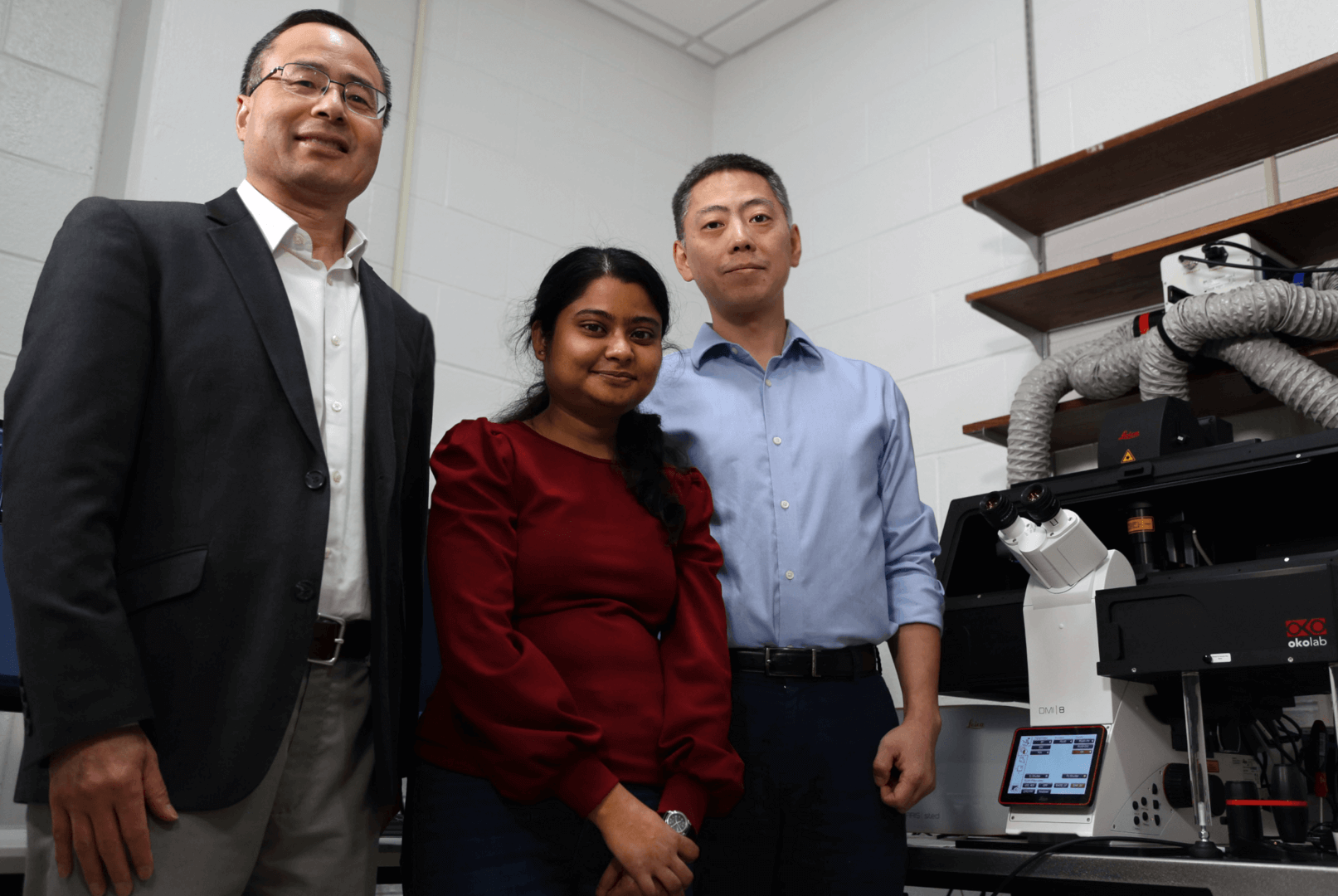2024 Bailey Award to Support Exploration into Antimicrobial Resistance, Antibiotic Alternatives
Caitlin Ware, Iowa State University Office of the Vice President for Research
Posted Mar 12, 2024

Caitlin Ware, Iowa State University Office of the Vice President for Research
Posted Mar 12, 2024

Iowa State University’s 2024 Bailey Research Career Development award has been granted to a team of Cyclone scholars with plans to address increasing rates of antimicrobial resistance by transforming predatory viruses into an antibiotic substitute.
The Bailey award — administered by the Iowa State University Office of the Vice President for Research (OVPR) — is given each year to faculty whose work is high-risk, high-reward and addresses emerging scientific, technical, or societal problems. Associate professor of Electrical and Computer Engineering Meng Lu and distinguished professor in Veterinary Microbiology and Preventive Medicine Qijing Zhang were recently selected for the annual award, and will receive $150,000 in institutional funding over a period of three years. Their project, titled, “Synthesis and Directed Evolution of Bacteriophage for Sensing, Therapy, and Beyond,” will investigate a novel treatment approach in lieu of traditional antibiotic use by designing and utilizing synthetic viruses capable of infecting and destroying various types of bacteria.
“We are thrilled to be the recipients of the 2024 Bailey award,” said Lu. “This endeavor represents an exciting research direction for my team, as we are always keen on exploring emerging biotechnologies, such as synthetic biology, gene editing, and protein engineering, and creating innovative solutions building off these to solve real world problems. Using foundational knowledge we have already collected, we are eager to execute this project and translate our expertise and hypothesis into practical solutions for real-world challenges.”
As a result of global overuse — and oftentimes incorrect use — of antibiotics, resistant strains of bacteria are on the rise, bringing with them significant economic and healthcare burdens. Unlike traditional broad-spectrum antibiotics, which function by stopping bacteria from multiplying or killing both harmful and beneficial bacteria entirely, bacteriophages are a special class of viruses that specifically target bacteria. More commonly referred to as “phages,” these unique viruses have the ability to infect and reproduce inside bacterial cells, destroying them completely.
Lu and Zhang intend to leverage the natural capabilities of phages by designing specialized DNA fragments to create a custom, synthetic virus able to produce reporter signals inside of a host cell without damaging the cell’s membrane – a process that would turn phages into sensors. The proposed sensors will be programmed to respond to only harmful strains of bacteria, leaving beneficial bacteria, such as probiotics, intact. Specifically, the project will explore a phage known as T7, which infects most strains of Escherichia coli (E. coli) bacteria. The completed phage sensors will have the potential to detect and treat antibiotic resistant bacteria, offering a much-needed therapeutic technology to combat antimicrobial resistance.
“The Bailey award empowers us to take bolder risks and pursue innovative, blue-sky ideas, allowing us to generate preliminary results that can support our quest for future external funding,” Zhang said. “Our aspiration for this project is to establish a technology that not only addresses challenges in therapy, biomanufacturing, and DNA data storage, but also encourages engineers and scientists to adopt a similar approach to come up with practical solutions. By demonstrating the potential of these techniques, we aim to inspire broader adoption and foster innovation in various fields.”
Critical to the project’s execution is the preliminary work accomplished by Electrical and Computer Engineering Ph.D. candidate Shirin Parvin, who Lu cites as instrumental in rapid design and assembly of engineered phage genomes, as well as effectively encapsulating them into phage capsids utilizing microfluidic chips.
“Shirin brings a unique combination of expertise in both electrical engineering and biology,” Lu said. “Specifically, she exhibits proficiency in DNA technology and molecular cloning, essential skills for our Bailey project. Together, the three of us will collaborate to nurture and advance our shared research endeavor.”
Moving forward, Lu and Zhang, with assistance from Parvin, will spend the first year of the project using Bailey award funding to design and manufacture synthetic phages. The following two years will focus on evaluating phage viability and tweaking functionality. At the end of three years, the research team plans to have a functional prototype prepared for implementation.
“Antimicrobial resistance is a significant ongoing challenge around the world that demands creative and innovative solutions,” said Vice President for Research Peter Dorhout. “The work of Doctors Zhang and Lu – and Ph.D. candidate Shirin Parvin – represents the essence of the annual Bailey award. Their bold research vision to create opportunities and forge new frontiers offers real hope in developing proactive and innovative solutions for reducing antimicrobial resistance, as well as a technology platform that could have far-reaching implications beyond AMR.”
The Bailey Research Career Development award, established in 2002 with a gift from Carl A. and Grace A. Bailey, is open to all Iowa State University full-time tenured associate professors and professors. More information about the application, review, and award process can be found here.
